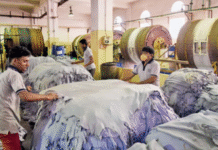
Senior commerce secretary Shubhashish Bose speaks at a seminar on ‘trade war and its implications for Bangladesh’, jointly organised by Dhaka Chamber of Commerce and Industry and Bangladesh Foreign Trade Institute at DCCI auditorium in Dhaka on Saturday. Export Promotion Bureau vice chairman Bijoy Bhattacharjee, BFTI chief executive officer Ali Ahmed, DCCI president Abul Kasem Khan, International Finance Corporation programme manager Masrur Reaz, DCCI director Humayun Rashid and Bangladesh Tariff Commission member Mostafa Abid Khan were present, among others. — New Age photo
Experts and businesses on Saturday said that Bangladesh would be immensely benefited in the area of export, import and investment from the ongoing trade war between the US and China if the country (Bangladesh) could prepare itself without any delay to utilise the potential.
Due to the trade war, many buyers of readymade garments were turning back to Bangladesh from China and it also created a scope for relocation of factories from China to Bangladesh, they said.
They said this at a seminar on ‘trade war and its implications for Bangladesh’ jointly organised by Dhaka Chamber of Commerce and Industry and Bangladesh Foreign Trade Institute at DCCI auditorium in the city.
The trade tension also shifted the export order of RMG more to Vietnam, Cambodia and even to Myanmar than to Bangladesh.
Moreover, depreciation of currencies of different counties including China against dollar would make Bangladeshi products less price competitive, BFTI chief executive officer Ali Ahmed said in his keynote presentation.
He also showed that due to the trade war prices of US cotton dropped by 10 per cent and Bangladesh could avail the advantage while at the same time depreciation of Chinese currency would make imports from China less costly.
Ali Ahmed, however, apprehended an import surge of cheap Chinese products.
The trade tension would create a positive impact on investment and many companies already started increasing their production capacity in Bangladesh, he noted.
Ali Ahmed identified bad state of ease of doing business as the greatest problem for attracting foreign direct investment and suggested branding the investment opportunities in Bangladesh to materialise the potential benefits of trade war.
He also suggested increasing supply capacity to meet the higher demand from buyers.
Ali Ahmed stressed analysing the opportunities, enhancing capacity, attracting investments and policy level readiness.
Citing a study report, senior commerce secretary Shubhashish Bose said that one third of US companies in China were looking to switch their production out of China and move towards Southeast Asia where labour was cheaper.
‘We have to set up some of the industrial zones as our capacity is not sufficient enough to attract all the sector of the global economy because we are actually used to labour intensive industry,’ he said.
He said, ‘Industrial revolution is just ahead and we need to invest robotics and artificial intelligence. We need FDI in those areas.’
Shubhashish said that Bangladesh needed to be prepared with infrastructural facilities but it had to be done in a hurry.
‘If we can get ourselves prepared within a short span of time, we will be able to get the benefits of trade war, otherwise we will lag behind,’ the commerce secretary said.
Once relocation took place towards Bangladesh during the trade war, the business would definitely not move back, he stressed.
Regarding devaluation of taka against dollar, he said it would be a risky step as devaluation of taka might increase inflation and Bangladesh should focus on productivity and diversification.
DCCI president Abul Kasem Khan in his speech said trade war could reduce global growth by at least 1.4 per cent over two years.
China recently announced a long list of tariff cuts on imports from South Korea, India, Bangladesh, Laos and Sri Lanka. Bangladesh needed to capitalise on the tariff cuts and seize this window of opportunity, he said.
Kasem said that many ‘sunset industries’ from China would need to move out and therefore Bangladesh would need to become the ideal destination.
‘Therefore, Bangladesh has to create a smooth transition process, enabling situation focusing on ease of doing business for the factories to be relocated and should have a planned marketing and branding mechanism,’ he said.
The DCCI president requested the government to form ‘national competitive strategic action taskforce’ to work on the impact of trade war and determine likely opportunities and challenge for Bangladesh in the days to come.
Bangladesh could be benefited by taking advantage of the supply chain relocation that was going to happen in the long run if the trade war persisted, Kasem added.
Masrur Reaz, programme manager of International Finance Corporation, stressed trade liberalisation, cost competitiveness, skills development and trade reforms to materialise the benefits of US-China trade war.
Emphasising infrastructure development, Bangladesh Tariff Commission member Mostafa Abid Khan said that for lack of infrastructure Bangladesh would not be able to attract the relocation of electronics production from China.
DCCI director Humayun Rashid said that trade war would give Bangladesh some opportunities, but the country was not yet ready to get the benefits.
He also said that opportunity should be given to open LC in Chinese Yuan as businesses were being affected to make their payment in dollar as China devalued its currency.
Source: New Age.









